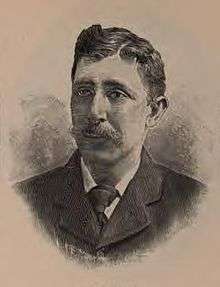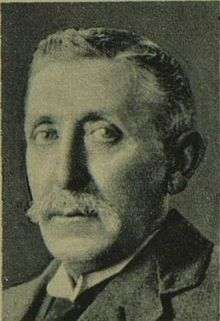Havelock Wilson



Joseph Havelock Wilson CH CBE (16 August 1859 – 16 April 1929) was a trade union leader, Liberal Party politician, and campaigner for the rights of merchant seamen.
He was born in Sunderland and went to sea as a boy, serving somewhere between 10 and 14 years at sea. In 1879 whilst still a seaman he married Jane Ann Watham at Sunderland. In 1882 he opened a "Temperance Hotel" in Sunderland settling down to life ashore at the age of 24. He became involved in a local seamen's union established in Sunderland in 1879 and had become its president by 1885. Wilson pursued a policy of attempting to build branches in nearby ports, which met with some success but led to disagreements within the leadership. In 1887, Wilson broke with the Sunderland union to establish his own National Sailors' & Firemen's Union, which was committed to a policy of expansion. Wilson remained president of the union until his death.
Trade union activities
Wilson rose to prominence in the late 1880s, on the back of the success of his union and his involvement in various strikes, including the 1889 London Dock Strike. Wilson's union suffered in the early 1890s and almost collapsed in 1894. Its revival came in 1911, with the outbreak of a wave of seamen's and dockers' strikes in British ports. Despite his militant tactics, Wilson was a relative moderate whose goal was to establish friendly relations with shipowners and formal conciliation procedures in the shipping industry to enable disputes to be resolved without recourse to strikes or lockouts. This goal was steadily achieved after shipowners recognised the union in 1911 and began working closely with officials during the First World War. After 1917, wage rates and conditions were set by the National Maritime Board, which represented the Shipping Federation and Wilson's union. In the 1920s, Wilson's reputation as a 'bosses' man' made him increasingly unpopular in the wider labour movement.
Political career
Wilson's first electoral contest was at a by-election in Bristol East in 1890, at which he did poorly.[1] He won his second contest, at Middlesbrough in 1892, in which he stood as an independent labour candidate in opposition to a Gladstonian Liberal, and a Liberal Unionist .[1] Having secured election, however, Wilson moved quickly to align himself with the Liberal Party and existing Lib–Lab Members of Parliament (MPs) such as Thomas Burt and John Wilson. Wilson continued to align himself with the Liberal Party in politics despite the establishment and growth of the Labour Party. Indeed, he was fiercely critical of the Labour Party and of key figures within it such as Keir Hardie and Ramsay MacDonald. He retained his Middlesbrough seat in the 1895 general election but narrowly lost to Samuel Alexander Sadler, a Conservative, in the 1900 election — an election characterised by a considerable swing towards the Conservatives.[1] He won Middlesbrough for a third and final time at the 1906 election.
| Party | Candidate | Votes | % | ± | |
|---|---|---|---|---|---|
| Liberal | Joseph Havelock Wilson | 9,271 | 52.6 | +2.8 | |
| Conservative | Sir Samuel Alexander Sadler | 6,864 | 39.0 | -11.3 | |
| Independent Labour | George Lansbury | 1,484 | 8.4 | n/a | |
| Majority | 2,407 | 13.6 | 14.0 | ||
| Turnout | 86.7 | ||||
| Liberal gain from Conservative | Swing | +7.0 | |||
He did not stand in 1910.[1]
He was a founder of the National Democratic Party but stood as a Liberal at the October 1918 by-election in South Shields, when he was elected unopposed.[1] He held the seat as a Coalition Liberal at the 1918 general election.[3] His last electoral contest came at the 1922 general election, when he stood as a National Liberal candidate, but lost his seat — coming third with only 20.5% of the vote.[3]
Wilson was noted as one of the most vociferous supporters of Britain's involvement in the First World War.
References
- 1 2 3 4 5 Craig, F. W. S. (1989) [1974]. British parliamentary election results 1885–1918 (2nd ed.). Chichester: Parliamentary Research Services. pp. 58, 84, 154, 191. ISBN 0-900178-27-2.
- ↑ British parliamentary election results, 1885-1918 (Craig)
- 1 2 Craig, F. W. S. (1983) [1969]. British parliamentary election results 1918–1949 (3rd ed.). Chichester: Parliamentary Research Services. ISBN 0-900178-06-X.
- Havelock Wilson exposed (1921) Early attempt by followers of Lenin to smear Wilson.
- Leigh Rayment's Historical List of MPs
External links
- Hansard 1803–2005: contributions in Parliament by Joseph Havelock Wilson
- Portraits of Joseph Havelock Wilson at the National Portrait Gallery, London

| Trade union offices | ||
|---|---|---|
| Preceded by New position |
General Secretary of the National Amalgamated Sailors' and Firemen's Union 1887–1893 |
Succeeded by Edmund Cathery |
| Preceded by John Wilson |
Chairman of the Parliamentary Committee of the Trades Union Congress 1892 |
Succeeded by John Burns |
| Preceded by Samuel Plimsoll |
President of the National Sailors' and Firemen's Union 1894–1929 |
Succeeded by Position abolished |
| Preceded by John Mallinson and Sam Woods |
Trades Union Congress representative to the American Federation of Labour 1897 With: Edward Harford |
Succeeded by William Inskip and Will Thorne |
| Parliament of the United Kingdom | ||
| Preceded by Isaac Wilson |
Member of Parliament for Middlesbrough 1892–1900 |
Succeeded by Sir Samuel Alexander Sadler |
| Preceded by Sir Samuel Alexander Sadler |
Member of Parliament for Middlesbrough 1906–1910 |
Succeeded by Penry Williams |
| Preceded by Cecil Algernon Cochrane |
Member of Parliament for South Shields 1918–1922 |
Succeeded by Edward Harney |